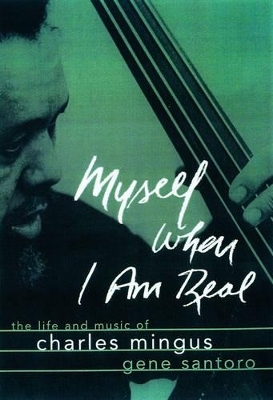
Myself When I Am Real
Oxford University Press Inc (Verlag)
978-0-19-514711-7 (ISBN)
A pioneering bassist and composer, Mingus redefined jazz's terrain. He penned over 300 works spannig gutbucket gospel, Colombian cumbias, orchestral tone poems, multimedia performance, and chamber jazz. By the time he was 35, his growing body of music won increasing attention as it unfolded into one pioneering musical venture after another, from classical-meets-jazz extended pieces to spoken-word and dramatic performances and television and movie soundtracks.
But Mingus got headlines less for his art than for his volatile and often provocative behaviour, which drew fans who wanted to watch his temper suddenly flare onstage. Keeping up with the organized chaos of Mingus's art demanded gymnastic improvisational skills and openness from his musicians, which is why some of them called it "the Sweatshop". He hired and fired musicians on the bandstand, attacked a few musicians physically and many more verbally, twice threw Lionel Hampton's drummer off the stage, and routinely harangued chattering audiences, once chasing a table of inattentive patrons out of the FIVE SPOT with a meat cleaver. But the musical and mental challenges this volcanic man set his bands also nurtured deep loyalties. Jey sidemen stayed with him for years and even decades.
In this biography, Santoro probes the sore spots in Mingus's easily wounded nature that helped make him so explosive: his bullying father, his interracila background, his vulnerability to women and distrust of men, his views of political and social issues, his overwhelming need for love and acceptance. Of black, white, and Asian decent, Mingus made race a central issue in his life as well as a crucial aspect of his music, becoming an outspoken (and often misunderstood) critic of racila injustice. Santoro gives us a vivid portrait of Mingus's development, from the racially mixed Watts where he mingled with artists and writers as well as mobsters, union toughs, and pimps to the artistic ferment of postwar Greenwich Village, where he absorbed and extended the radical improvistation flowing through the work of Allen Ginsbert, Jackson Pollock, and Charlie Parker. Indeed, unlike most jazz biographers, Santoro examines Mingus's etra-musical influences - from Orson Welles to Langston Hughes, Farwell Taylor, and Timothy Leary - and illuminates his achievement in the broader cultural context it demands. Written in a lively, novelistic style, "Myself When I Am Real" draws on dozens of new interviews and previously untapped letters and archival materials to explore the intricate connections between this extraordinary man and the extraordinary music he made.
A former Fulbright scholar, book editor and musician, Gene Santoro is a music critic at the New York Daily News and columnist at The Nation and Chamber Music. The author of Dancing in Your Head and Stir It Up, he has written articles and essays for The Atlantic Monthly, The New York Times, The Village Voice, Spin, Rolling Stone, and Down Beat. He divides his time between New York City and Shokan, New York.
Preface ; Introduction ; Prologue: Better Get It In Your Soul ; 1. Growing Up Absurd ; 2. Black Like Me ; 3. Making the Scene ; 4. Life During Wartime ; 5. Portrait of the Artist ; 6. The Big Apple, or On the Road ; 7. Pithecanthropus Erectus ; 8. Mingus Dynasty ; 9. Camelot ; 10. The Black Saint and the Sinner Lady ; 11. One Flew over the Cuckoo's Nest ; 12. Beneath the Underdog ; 13. Let My Children Hear Music ; 14. Changes ; 15. Don't Be Afraid, the Clown's Afraid, Too ; Notes ; Bibliography ; Discography ; Acknowledgements ; Index
| Erscheint lt. Verlag | 21.2.2002 |
|---|---|
| Zusatzinfo | 29 halftones |
| Verlagsort | New York |
| Sprache | englisch |
| Maße | 155 x 230 mm |
| Gewicht | 708 g |
| Themenwelt | Literatur ► Biografien / Erfahrungsberichte |
| Kunst / Musik / Theater ► Musik ► Jazz / Blues | |
| ISBN-10 | 0-19-514711-1 / 0195147111 |
| ISBN-13 | 978-0-19-514711-7 / 9780195147117 |
| Zustand | Neuware |
| Haben Sie eine Frage zum Produkt? |
aus dem Bereich


